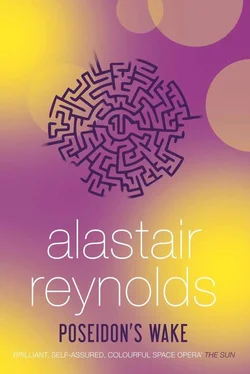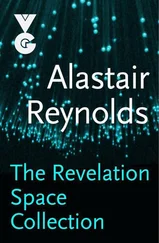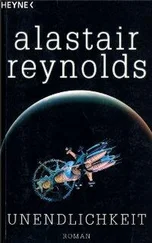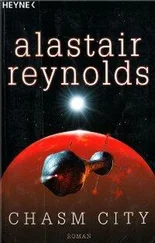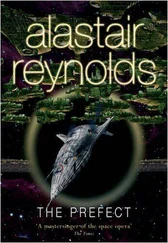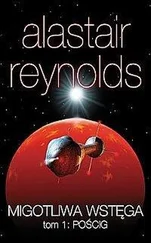‘I said what was on my mind.’
‘Yes, we noticed.’ Maslin Karayan’s eyes narrowed at her from beneath his formidable brow. ‘Crucible is a democracy, in case you didn’t realise. And we are aboard this ship by mutual consent — as entitled to our places as you or any of the other scientists.’
‘I didn’t say you weren’t.’
‘You also made no secret of your ill-feelings,’ Karayan said.
‘I’m entitled to them,’ Goma said, feeling a certain shameful thrill in her own studied belligerence.
The younger man had been silent until now. He had a pale complexion and a mop of blond hair which sat on his scalp in tight curls, save for a cowlick covering half his forehead.
‘Do you really hate us that much, Goma? Just because we have a slightly different set of values from your own?’
‘I must go on ahead and meet my wife,’ Karayan told the other man. ‘I will see you at the evening gathering, Peter.’
‘Thank you, Maslin.’
Karayan touched a big hand to the younger man’s shoulder and proceeded down the corridor, leaving Goma alone with the man named Peter.
‘I’m not stopping you from leaving,’ Goma said.
The man smiled, although there was more sadness than amusement in his expression. ‘I am Peter Grave, for what it’s worth. Yes, I’m a Second Chancer and I respect Maslin, but I’m also hoping you and I might become friends, at least while we’re stuck inside this ship.’
‘Why would you want that?’
‘Because I admire you. Because I know what you did, to spare your mother from this.’
‘The last thing I want to hear is a Second Chancer talking about my mother.’
‘Ours is a broad alliance. Not everyone holds Ndege to the same accountability.’
‘So what do you think?’
‘I think there are always grounds for forgiveness.’
‘Then you’re wrong. My mother didn’t need forgiveness. Forgiveness is only required when you commit a crime.’
‘And your mother’s deeds don’t count as a crime?’
‘She was trying to do something good.’
‘I don’t dispute that, but good deeds alone can’t excuse mistakes that kill hundreds of thousands of people.’ Grave offered her the palms of his hands. ‘Look, the last thing I want is to get into all that. I just feel that if we can at least agree to rub along together, it’s going to make life a lot easier for all of us. Maslin’s not such an ogre, you know — none of us is.’
‘Do you believe in a god, Peter Grave?’
‘My beliefs or otherwise don’t lend themselves to simple answers.’
‘That’s a yes, then.’
‘You are doing me a disservice, Goma.’ He averted his eyes, looking regretful. ‘Honestly, I was hoping for better from you. Open-mindedness, a willingness to accept differing viewpoints—’
‘There’s only one viewpoint.’
‘The infallible wisdom of science?’
‘Call it what you like.’
‘It might surprise you to know that I’m a great admirer of science. I’ve even read some of your work.’
‘I suppose it helps to know your enemy.’
‘Oh, please.’ At last he raised a surrendering hand. ‘Never mind. Point made. Point very excellently made. I’m sorry I detained you — sorry one of us wasn’t ready to begin building a bridge. You’re wrong, though — wrong about me, wrong about all of us. I just hope it doesn’t take the rest of the voyage for you to see your way past your prejudice.’
Goma blinked in surprise. ‘ I’m the prejudiced one?’
But Peter Grave was already easing past her. ‘Goodbye, Goma Akinya.’
Kanu had been travelling on Earth for a week by the time he reached Lisbon. That time seemed improbably full of incident: the visit to the grieving Dalals, the airship flight across the Arabian sea, the warm reception in the aqualogy, his dismay at the plight of his old friend Leviathan. With his obligation to the Dalals discharged, and having paid a courtesy visit to the merfolk, he at last felt that he could afford to slow down and spend some time in one place. Finding lodgings had taken the better part of a day; now, rested — and no longer finding Earth’s light and gravity quite so burdensome as when he had first arrived — Kanu had no grand plans for his day beyond a trip to the quayside and a visit to an art show. He set out in a water taxi, a buzzing electric thing that conveyed him and a handful of fellow travellers the short distance to the concrete jetty, built around the feet of a Provider robot.
The towering, crane-sized robot had been there since the Mechanism fell, still poised halfway out into the Tagus River, where it was working at the time. Much too vast to move or economically dismantle, it now formed a permanent if unintentional sculptural installation. Accepting the inevitable, the city had put a landing deck on top of the Provider and jetties around its feet, then run elevators and staircases up the inside of its tripedal legs. Within its body and the bulges of its limbs’ articulation points, thousands of tonnes of useless machinery had been torn out to make way for multi-purpose event spaces. It was here, inside the Provider, that one of the most significant Sunday Akinya retrospectives in recent years was taking place.
Kanu had bought a ticket and joined the line on the jetty waiting for the elevators. Despite his diplomatic status on Mars and the link between his name and artist’s, he was no kind of celebrity on Earth. He moved through Lisbon in blissful obscurity, barely attracting a second glance. If he was noticed at all, it was only because merfolk always drew a certain amount of attention wherever they went. He had dressed in simple clothes, slung a shabby second-hand satchel over his shoulder and bolstered his anonymity with a pair of antique sunglasses. He was not even the only African-Aquatic in the line.
He entered the cool of the lift, which carried him up the leg to the exhibition level. He lingered in the windowed entrance lobby for a few moments, enjoying the view of Lisbon from this elevated vantage point. There was nothing to rival it anywhere in the city itself, and as he traced the maze of streets and squares around his pension, he felt the slow uncoiling of old spatial memories. Many years had passed since his last visit, but Lisbon was like the sea. It could change, and change again, yet in its eternal changefulness, the city would never be entirely unfamiliar to him.
Kanu crossed the lobby and entered the event space. Although the exhibition was sold out, the organisers had kept the numbers at a manageable level. The retrospective was divided into three main sections: paintings, sculpture, and decorative pieces and public works. Within each section, the pieces had been organised in approximate order of completion.
Kanu dithered over where to start. He had no real sense of how these works slotted into the larger narrative of Sunday’s life — whether she had been a sculptor before a painter, a decorator before a sculptor. With some trepidation, he dug the brochure out of his satchel. Unfortunately it offered little help on the matter — it appeared to be written with a tacit assumption of knowledge he had not yet acquired. Even the floor plan appeared to have been drawn in a deliberately counter-intuitive way, so that he had to hold it upside down to orientate himself with respect to the point of entry. Kanu observed the other patrons, who were strolling around with an air of cultured self-confidence, casually pointing out this and that to each other as if the landmarks and milestones of Sunday’s career were too obvious to mention.
Never mind. He had to start somewhere.
Near the entrance, preserved on a plinth, was a section of wall that had been cut and removed from the Descrutinized Zone on the Moon. It contained a piece of psycho-reactive graffiti done by Sunday in or around 2163. Kanu wandered over and tried to make sense of the piece. He stared at the smear of clashing colours, daring it show some acknowledgement of his presence. According to the accompanying text, the ‘paint’ was in fact a kind of licensed nanotechnology infiltrated with invisible attention-tracking devices. Those parts that were ‘looked at’ the most intensely would resist being overpainted by other hands. Areas of the art which suffered attentional neglect were liable to be changed. Kanu was free to drag his finger across the piece’s surface, altering colour and texture — but the installation always reset itself on the hour, reverting to the form it had taken when it was last on the Moon.
Читать дальше
